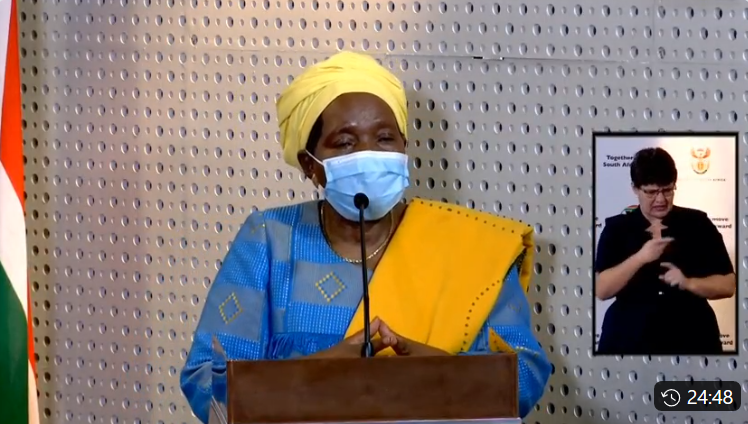By Skylar Thoma and Ayinde Summey
MAIN IMAGE: Minister of Cooperative Governance and Traditional Affairs Nkosazana Dlamini-Zuma speaks at a press briefing Thursday, announcing that some lockdown regulations “will remain in place for a long time”. SOURCE: Screen grab from Twitter @PresidencyZA
South Africa is facing an extended period of coronavirus restrictions – even if the country’s lockdown is partially lifted on April 30.
This was the message of Minister of Cooperative Governance and Traditional Affairs Nkosazana Dlamini-Zuma on Thursday as she announced details of a two-week extension of the country’s lockdown which has been in place since March 26.
In a publicly broadcast briefing of the national command council (NCC) on COVID-19, Dlamini-Zuma said that when regulations are eventually lifted, this would have to be done gradually. “When we do stop the lockdown, we cannot do it abruptly – that today it’s complete lockdown and tomorrow it’s open completely”, she explained. “We have to phase it in, so that there is an orderly move towards normality.”
Many of the regulations that have been in place since the start of the lockdown are being extended, the NCC announced. These include the existing ban on cigarettes and current restrictions around funerals, which limit the number of attendees to 50 people.
But some amendments have been introduced. Dlamini-Zuma said the government is expanding the ban on liquor products by banning the transport of alcoholic beverages. Earlier this week the Gauteng Liquor Forum threatened legal action against the government if it did not ease restrictions on alcohol sales. The government asked the organisation to wait until Friday for an official response. The Forum has not yet responded to the announcement of the extension of the liquor ban.
The government is also beginning to open up the mining industry, allowing many mines to operate at 50 percent capacity. Dlamini-Zuma added that “all the mines that supply Eskom must be fully operational”.
“Some [regulations] will remain in place for a very long time”, Dlamini-Zuma said, although she did not specify which these would be.
As of Thursday South Africa had 2605 confirmed cases of the coronavirus. Worldwide there are now over 2 million cases with over 140,000 deaths.
Other countries are contemplating how and when to relax their measures to combat the virus. Japan announced Thursday that the government is extending lockdown measures to the entire country, intensifying its State of Emergency which was introduced less than two weeks ago in some of the country’s prefectures. Prime Minister Shinzo Abe has said he wants to limit contact among the public by 80%,” reported Kyoto News.
In the United Kingdom, foreign secretary Dominic Raab has said that stay home orders will be in place for at least another three weeks to avoid damage to the economy and public health.
Raab told reporters that according to research done by Sage, a company advising the UK government, the infection rate in the country is below one per person, meaning each infected person is passing on the virus to one or less than one person. The government wants the rate to reduce further and is concerned that lifting the restrictions might cause another peak.
“We have been very clear that we will take the right decisions at the right moments based on the evidence. And they may well involve a transition out of the current measures. And, of course, they could be calibrated in different ways.” The Guardian reported Raab saying.
Five conditions will have to be met before restrictions can be lifted.
Among these are whether the NHS is able to handle the infection load; whether the death rate is consistently falling (to indicate whether the peak has passed throughout the country), and that there are sufficient testing spaces and PPE to account for future demand.
The Guardian quoted Sir Patrick Vallance, the UK’s chief scientific advisor saying that to disrupt transmission and avoid a second wave, it would likely be necessary for people to prepare to work from home for a long period of time. Medicines and vaccines that are also essential have not yet been identified and, there is currently no way to tell when that will arrive, he said.




